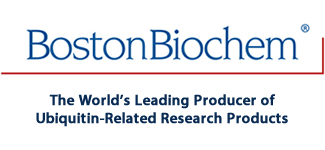
Recombinant Human His6-Ubiquitin Mutant K29R Protein, CF Summary
Product Datasheets
Carrier Free
CF stands for Carrier Free (CF). We typically add Bovine Serum Albumin (BSA) as a carrier protein to our recombinant proteins.Adding a carrier protein enhances protein stability, increases shelf-life, and allows the recombinant protein to be stored at a more dilute concentration.The carrier free version does not contain BSA.
In general, we advise purchasing the recombinant protein with BSA for use in cell or tissue culture, or as an ELISA standard.In contrast, the carrier free protein is recommended for applications, in which the presence of BSA could interfere.
UM-HK29R
| Formulation | Lyophilized from a solution in HEPES. |
| Shipping | The product is shipped at ambient temperature. Upon receipt, store it immediately at the temperature recommended below. |
| Stability & Storage: | Use a manual defrost freezer and avoid repeated freeze-thaw cycles.
|
Reconstitution Calculator
Background: Ubiquitin
Ubiquitin is a 76 amino acid (aa) protein that is ubiquitously expressed in all eukaryotic organisms. Ubiquitin is highly conserved with 96% aa sequence identity shared between human and yeast Ubiquitin, and 100% aa sequence identity shared between human and mouse Ubiquitin (1). In mammals, four Ubiquitin genes encode for two Ubiquitin-ribosomal fusion proteins and two poly-Ubiquitin proteins. Cleavage of the Ubiquitin precursors by deubiquitinating enzymes gives rise to identical Ubiquitin monomers each with a predicted molecular weight of 8.6 kDa. Conjugation of Ubiquitin to target proteins involves the formation of an isopeptide bond between the C-terminal glycine residue of Ubiquitin and a lysine residue in the target protein. This process of conjugation, referred to as ubiquitination or ubiquitylation, is a multi-step process that requires three enzymes: a Ubiquitin-activating (E1) enzyme, a Ubiquitin-conjugating (E2) enzyme, and a Ubiquitin ligase (E3). Ubiquitination is classically recognized as a mechanism to target proteins for degradation and as a result, Ubiquitin was originally named ATP-dependent Proteolysis Factor 1 (APF-1) (2,3). In addition to protein degradation, ubiquitination has been shown to mediate a variety of biological processes such as signal transduction, endocytosis, and post-endocytic sorting (4-7).
Mutation of lysine 29 to arginine renders Ubiquitin unable to form poly-Ubiquitin chains via lysine 29 linkages with other Ubiquitinmolecules. Ubiquitin K29R can form a Ubiquitin-activating (E1) enzyme-catalyzed active thioester at the C-terminus allowing the molecule to be transferred to the lysines of substrate proteins. Ideal for the reduction in poly-Ubiquitin chain length/conjugation rates and determining if poly-Ubiquitin chains are K29 linked.
FAQs
No product specific FAQs exist for this product, however you may
View all Proteins and Enzyme FAQsRecombinant Enzymes
Recombinant Human His6-USP7 Protein, CF
Recombinant Human His6UBE2S Protein, CF
Recombinant Human Isopeptidase T/USP5 Protein, CF
Recombinant Human STAM-1 Protein, CF
Recombinant Human Ubiquitin Activating Enzyme (UBE1), CF
Recombinant Human His6-UBE2N/UBE2V2 Complex Protein, CF
Recombinant Human His6-UAF1 Protein, CF
Recombinant Human UCH-L3 Protein, CF
Recombinant Human UBE2K/E2-25K Protein, CF
Reviews for Recombinant Human His6-Ubiquitin Mutant K29R Protein, CF
There are currently no reviews for this product. Be the first toreview Recombinant Human His6-Ubiquitin Mutant K29R Protein, CF and earn rewards!
Have you used Recombinant Human His6-Ubiquitin Mutant K29R Protein, CF?
Submit a review and receive an Amazon gift card.
$25/€18/£15/$25CAN/¥75 Yuan/¥1250 Yen for a review with an image
$10/€7/£6/$10 CAD/¥70 Yuan/¥1110 Yen for a review without an image
ebiomall.com






>
>
>
>
>
>
>
>
>
>
>
>
检测HIV感染者体液中病毒抗原和抗体的方法,操作方便,易于普及应用,其中抗体检测尤普通。但HIv P24抗原和病毒基因的测定,在HIV感染检测中的地位和重要性也日益受到重视。
抗体检测
抗体检测
血清中HIV抗体是判断HIV感染的间接指标。根据其主要的适用范围,可将现有HIV抗体检测方法分为筛检试验和确证试验。
确证试剂
筛检实验阳性血清的确证最常用的是Western blot(WB),由于该法相对窗口期较长,灵敏度稍差,而且成本高昂,因此只适合作为确证实验。随着第三代和第四代HIV诊断试剂灵敏度的提高,WB已越来越满足不了对其作为确证实验的要求。
FDA批准的另一类筛检确证试剂是-免疫荧光-试验(IFA)。IFA比WB的成本低,而且操作也相对简单,整个过程在1-1.5小时内即可结束。此法的主要缺点是需要昂贵的荧光检测仪和有经验的专业人员来观察评判结果,而且实验结果无法长期保存。现在FDA推荐在向WB不能确定的供血员发布最终结果时以IFA的阴性或阳性为准,但不作为血液合格的标准。
筛检试验
筛检试验主要用于对供血员进行筛查,因此要求操作简便,成本低廉,而且灵敏、特异。2012年,世界上主要的筛检方法仍然是ELISA,还有少数的颗粒凝集试剂和快速ELISA试剂。ELISA有很高的灵敏度和特异性,操作简单,仅需要实验室配备酶标仪和洗板机即可应用,特别适合于试验室大规模筛检使用。
颗粒凝集实验是另一种操作简单方便,成本低廉的检测方法,该方法结果可通过肉眼判定,灵敏度很高,特别适合发展中国家或大量筛选供血员时使用,缺点是必须使用新鲜样品,特异性较差。
80年代后期发展起来的斑点印迹检测(Dot-blot assay)是一种快速ELISA(Rapid ELISA)方法,这种方法操作极为简便,过程短暂,整个过程多数在5-10分钟内甚至3分钟内即可结束,但该法比ELISA和颗粒凝集试剂昂贵得多。
人类免疫缺陷病毒抗体口腔粘膜渗出液检测试剂盒(胶体金法)就属于侧向免疫层析法(金免疫)类别,基于免疫层析技术通过手工操作、肉眼读取结果、20分钟即可定性得出检测结果的快速诊断试剂,用于检测口腔粘膜渗出液样本中的HIV-1型和HIV-2型抗体。可用于自愿咨询检测、不愿采血、晕针患者的初筛。该方法适用于初筛检测,凡由该试剂测定为阳性者,需进行进一步筛查确认。[3]
【HIV阴性】说明从人体内检测不到HIV抗体,阴性符号以(-)表示。不能说没有感染HIV, 要看是什么时候检测的,在窗口期内,感染者的体内还没有产生HIV抗体,或还没有产生足量的HIV抗体,这时HIV检测是阴性结果,如果在窗口期之后检测的,可以排除感染HIV的可能。
【HIV阳性】说明从人体内检测到了HIV抗体,阳性符号以(+)表示。
【检测结果不定因素】
感染还处于窗口期:从HIV进入体内到检测这段时间还不够长,因此血清还没有形成典型的抗体反应
艾滋病进展到终末期,抗体水平下降
其他非病毒蛋白抗体的交叉反应:自身免疫性疾病、某些恶性疾病、怀孕、输血或器官移植等情况下,身体可以产生一些抗体,其反应与HIVP24核心蛋白抗体引起的反应很相似
抗原检测
病原检测主要指用病毒分离培养、电镜形态观察、病毒抗原检测和基因测定等方法从宿主标本中直接检测病毒或病毒基因。由于前两种方法难度大,且需要特殊设备和专业技术人员。因此仅抗原检测和RT-PCR(反转录-PCR)可用于临床诊断。HIV-1P24抗原检测可用于HIV-1抗体不确定或窗口期的辅助诊断;HIV-1抗体阳性母亲所生婴儿早期的辅助鉴别诊断;第四代HIV-1抗原/抗体ELISA试剂检测呈阳性,但HIV-1抗体确认阴性者的辅助诊断。P24抗原检测一般用ELISA双抗体夹心法试剂,试剂必须经过SDA批准注册、在有效期内,其阳性结果必须依据试剂说明书经中和试验确认。HIV-1P24抗原检测的敏感性为30-90%,该结果仅作为HIV感染的辅助诊断依据,不能据此确诊;HIV-1 P24抗原检测阴性只表示在本试验中无反应,不能排除HIV感染,临床中一般不作为常规诊断项目。
核酸检测
HIV核酸检测可用于HIV感染的辅助诊断、病程监控、指导治疗方案及疗效判定、预测疾病进展等。常用的HIV病毒载量检测方法包括逆转录PCR实验(RT-PCR)、核酸序列扩增实验(NASBA)、分支DNA杂交实验(bDNA)以及实时荧光定量PCR技术。值得注意的是,每一种HIVRNA定量系统都有其最低检测限,即可以测出的最低拷贝数或国际单位,RNA定量检测时未测出不等于样品中不含有病毒RNA,因此HIV核酸定性检测阴性,只可报告本次实验结果阴性,但不能排除HIV感染;HIV核酸检测阳性,可作为诊断HIV感染的辅助指标,不能单独用于HIV感染的诊断。报告HIV核酸定量检测结果时应按照仪器读数报告结果,注明使用的实验方法、样品种类和样品量,当测定结果小于最低检测限时,应注明最低检测限水平。
HIV核酸定性检测也可用于HIV感染的辅助诊断,在分析HIV基因亚型和变异等基础研究中应用。通常使用PCR或RT-PCR技术,使用分子生物学实验室通用的扩增试剂,引物可来自文献或自行设计,应尽量覆盖所有或常见的毒株,也可使用复合引物。报告定性检测结果时应注明反应条件和所使用的引物序列。此外,利用核酸检测方法的高度敏感性,使用集合核酸扩增检测技术和方法,对高度怀疑感染人群且抗体阴性的样品进行集合核酸检测,可及时发现窗口期感染者。该方法较单份样品的核酸检测具有更高的成本效益。aware天猫
首先,不否认它比大多数国产的试剂盒做得好,提取的纯度、方便度和量,都还很不错。
其次,它是日本的。so我觉得实验室用用天根的,就非常好了。拒绝日货,从实验室做起。
抗体检测
抗体检测
血清中HIV抗体是判断HIV感染的间接指标。根据其主要的适用范围,可将现有HIV抗体检测方法分为筛检试验和确证试验。
确证试剂
筛检实验阳性血清的确证最常用的是Western blot(WB),由于该法相对窗口期较长,灵敏度稍差,而且成本高昂,因此只适合作为确证实验。随着第三代和第四代HIV诊断试剂灵敏度的提高,WB已越来越满足不了对其作为确证实验的要求。
FDA批准的另一类筛检确证试剂是-免疫荧光-试验(IFA)。IFA比WB的成本低,而且操作也相对简单,整个过程在1-1.5小时内即可结束。此法的主要缺点是需要昂贵的荧光检测仪和有经验的专业人员来观察评判结果,而且实验结果无法长期保存。现在FDA推荐在向WB不能确定的供血员发布最终结果时以IFA的阴性或阳性为准,但不作为血液合格的标准。
筛检试验
筛检试验主要用于对供血员进行筛查,因此要求操作简便,成本低廉,而且灵敏、特异。2012年,世界上主要的筛检方法仍然是ELISA,还有少数的颗粒凝集试剂和快速ELISA试剂。ELISA有很高的灵敏度和特异性,操作简单,仅需要实验室配备酶标仪和洗板机即可应用,特别适合于试验室大规模筛检使用。
颗粒凝集实验是另一种操作简单方便,成本低廉的检测方法,该方法结果可通过肉眼判定,灵敏度很高,特别适合发展中国家或大量筛选供血员时使用,缺点是必须使用新鲜样品,特异性较差。
80年代后期发展起来的斑点印迹检测(Dot-blot assay)是一种快速ELISA(Rapid ELISA)方法,这种方法操作极为简便,过程短暂,整个过程多数在5-10分钟内甚至3分钟内即可结束,但该法比ELISA和颗粒凝集试剂昂贵得多。
人类免疫缺陷病毒抗体口腔粘膜渗出液检测试剂盒(胶体金法)就属于侧向免疫层析法(金免疫)类别,基于免疫层析技术通过手工操作、肉眼读取结果、20分钟即可定性得出检测结果的快速诊断试剂,用于检测口腔粘膜渗出液样本中的HIV-1型和HIV-2型抗体。可用于自愿咨询检测、不愿采血、晕针患者的初筛。该方法适用于初筛检测,凡由该试剂测定为阳性者,需进行进一步筛查确认。[3]
【HIV阴性】说明从人体内检测不到HIV抗体,阴性符号以(-)表示。不能说没有感染HIV, 要看是什么时候检测的,在窗口期内,感染者的体内还没有产生HIV抗体,或还没有产生足量的HIV抗体,这时HIV检测是阴性结果,如果在窗口期之后检测的,可以排除感染HIV的可能。
【HIV阳性】说明从人体内检测到了HIV抗体,阳性符号以(+)表示。
【检测结果不定因素】
感染还处于窗口期:从HIV进入体内到检测这段时间还不够长,因此血清还没有形成典型的抗体反应
艾滋病进展到终末期,抗体水平下降
其他非病毒蛋白抗体的交叉反应:自身免疫性疾病、某些恶性疾病、怀孕、输血或器官移植等情况下,身体可以产生一些抗体,其反应与HIVP24核心蛋白抗体引起的反应很相似
抗原检测
病原检测主要指用病毒分离培养、电镜形态观察、病毒抗原检测和基因测定等方法从宿主标本中直接检测病毒或病毒基因。由于前两种方法难度大,且需要特殊设备和专业技术人员。因此仅抗原检测和RT-PCR(反转录-PCR)可用于临床诊断。HIV-1P24抗原检测可用于HIV-1抗体不确定或窗口期的辅助诊断;HIV-1抗体阳性母亲所生婴儿早期的辅助鉴别诊断;第四代HIV-1抗原/抗体ELISA试剂检测呈阳性,但HIV-1抗体确认阴性者的辅助诊断。P24抗原检测一般用ELISA双抗体夹心法试剂,试剂必须经过SDA批准注册、在有效期内,其阳性结果必须依据试剂说明书经中和试验确认。HIV-1P24抗原检测的敏感性为30-90%,该结果仅作为HIV感染的辅助诊断依据,不能据此确诊;HIV-1 P24抗原检测阴性只表示在本试验中无反应,不能排除HIV感染,临床中一般不作为常规诊断项目。
核酸检测
HIV核酸检测可用于HIV感染的辅助诊断、病程监控、指导治疗方案及疗效判定、预测疾病进展等。常用的HIV病毒载量检测方法包括逆转录PCR实验(RT-PCR)、核酸序列扩增实验(NASBA)、分支DNA杂交实验(bDNA)以及实时荧光定量PCR技术。值得注意的是,每一种HIVRNA定量系统都有其最低检测限,即可以测出的最低拷贝数或国际单位,RNA定量检测时未测出不等于样品中不含有病毒RNA,因此HIV核酸定性检测阴性,只可报告本次实验结果阴性,但不能排除HIV感染;HIV核酸检测阳性,可作为诊断HIV感染的辅助指标,不能单独用于HIV感染的诊断。报告HIV核酸定量检测结果时应按照仪器读数报告结果,注明使用的实验方法、样品种类和样品量,当测定结果小于最低检测限时,应注明最低检测限水平。
HIV核酸定性检测也可用于HIV感染的辅助诊断,在分析HIV基因亚型和变异等基础研究中应用。通常使用PCR或RT-PCR技术,使用分子生物学实验室通用的扩增试剂,引物可来自文献或自行设计,应尽量覆盖所有或常见的毒株,也可使用复合引物。报告定性检测结果时应注明反应条件和所使用的引物序列。此外,利用核酸检测方法的高度敏感性,使用集合核酸扩增检测技术和方法,对高度怀疑感染人群且抗体阴性的样品进行集合核酸检测,可及时发现窗口期感染者。该方法较单份样品的核酸检测具有更高的成本效益。aware天猫展开









